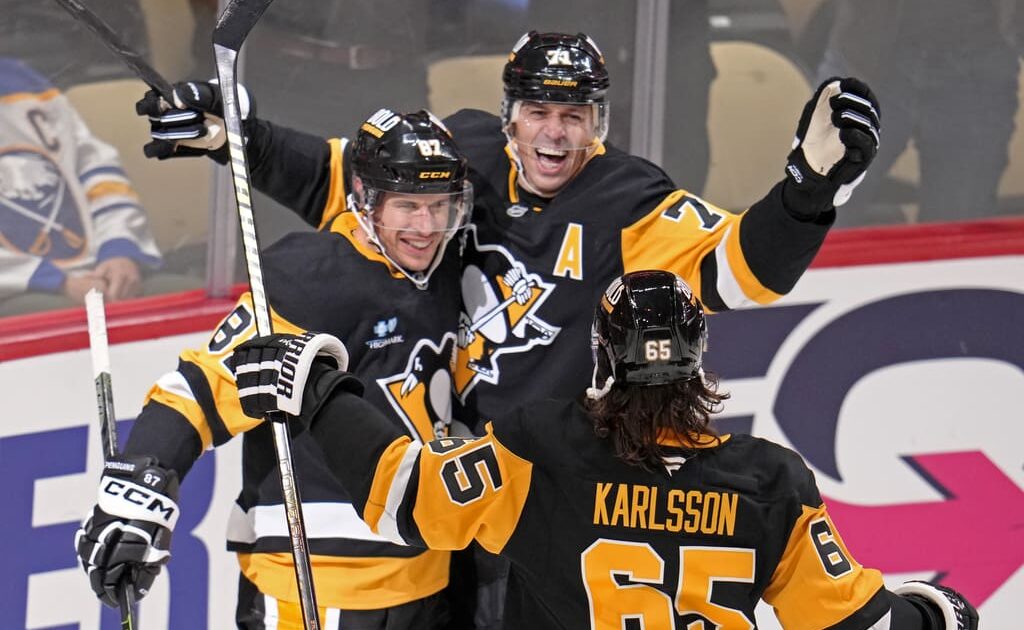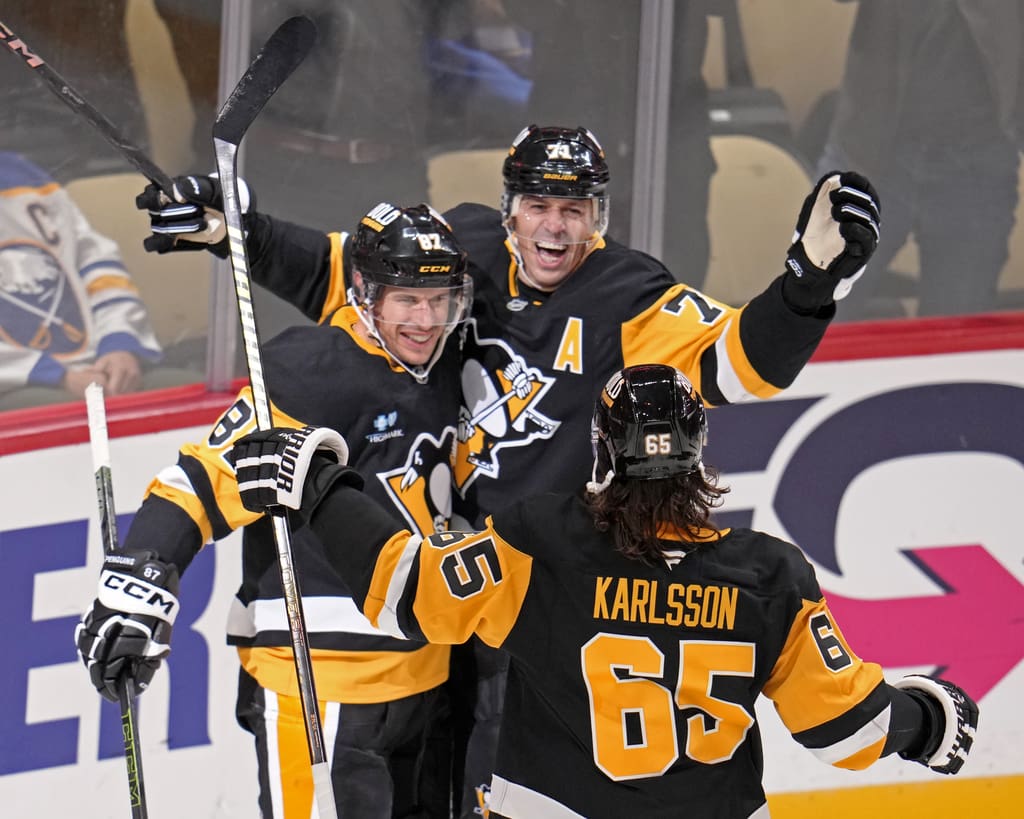 Pittsburgh Penguins’ Sidney Crosby (87) celebrates his game-winning goal in overtime with Evgeni Malkin (71) and Erik Karlsson (65) during an NHL hockey game against the Buffalo Sabres in Pittsburgh, Wednesday, Oct. 16, 2024. (AP Photo/Gene Puskar)
Pittsburgh Penguins’ Sidney Crosby (87) celebrates his game-winning goal in overtime with Evgeni Malkin (71) and Erik Karlsson (65) during an NHL hockey game against the Buffalo Sabres in Pittsburgh, Wednesday, Oct. 16, 2024. (AP Photo/Gene Puskar)
Late August has become a quiet hotbed of Pittsburgh Penguins news. Nothing has happened, but it seems that much will soon, or at least could.
New ownership is not something to take lightly. The Penguins have been remarkably stable for the 18 years since the state of Pennsylvania, city of Pittsburgh, and Penguins ownership, including Mario Lemieux, agreed to a new arena that is now PPG Paints Arena.
The Lemieux Group was sold to Fenway Sports Group in 2021 after FSG made an above-market offer. It was time for Mario to get paid and see what life outside of hockey held.
Four years later, Lemieux reportedly tried to buy back the team, but his offer was short, and the Hoffman Family of Companies has emerged as a serious contender to buy the team while stories of FSG’s lack of interest in the NHL grow.
Even if the Hoffmans don’t buy the team, there has been a destabilizing effect. The detachment between the Boston-based FSG and Pittsburgh is being felt by fans accustomed to locally based owners who are a part of the community.
However, the Hoffmans are also not local, living in Florida with their corporate headquarters based in Chicago.
After speaking with financial professionals this week, PHN has received numerous potential structures for a sale to a company or individuals that would not have the ability to complete a front-loaded cash sale.
With the exorbitant price tags on professional sports teams (and even some athletes), deferred money has become a popular solution. Buy now, pay later … and keep paying.
Cash downpayments for the sale could range from $200 million to $700 million range with various forms of financing for the remainder. With interest rates currently in the 7% range, a 10-year loan could cost a new owner about $2.5 billion–that’s $250 million per year.
Of course, those are rough numbers, and at the highest levels of banking and finance, there are always sweetheart deals to be had, those with preferential rates and terms that would not be available to you or me.
As industrial baron J. Paul Getty famously said, “When you owe the bank a million dollars, the bank owns you. When you owe the bank a billion dollars, you own the bank.”
However, team values have exploded, and the number of potential buyers is a smaller, though more powerful pool than before. When the Lemieux Group owned the Penguins, co-owner Ron Burkle’s net worth was several times the valuation of the team. Such differentials were commonplace.
There are legitimate questions, which we will probably repeat if the sale becomes official.
Does Hoffman have the resources to continue Hill District redevelopment?
Does Hoffman have the ability to spend to the salary cap as it grows, but the Penguins are about to enter a declining revenue phase? Will they also have the resources to invest as heavily in player development and strength training as FSG has done?
Will the Hoffman Family of Companies keep the Penguins separate from their expansive business portfolio, which has dozens of small companies, such as Mitch’s Cookies and a handful of small-town newspapers, or will revenues be shared across the divide?
Will Mitch’s Cookies or Elmer’s Chocolate (I hear it’s great) be available in the press box?
Evgeni Malkin
This season might very well be Malkin’s last ride. If it is, he will leave with nothing left to accomplish, nothing left to prove, and a lot of people will have overlooked one of the greatest hockey players to have played.
Last season, the now-39-year-old center’s offensive totals dipped further. He scored only 16 goals with 50 points in 68 games. On paper, that’s an acceptable number for a second-line center, but they are not numbers befitting Malkin.
Was it age catching him? Perhaps a bit, as he’s clearly not able to do some of the things he once did. That big galloping stride is gone, and even Malkin admitted publicly he has diminished, though he may have exaggerated some in his public comments.
Yet a quick look at his actual production shows that he could have a significant rebound season without playing any better.
Last season, Malkin spent 242 minutes with Philip Tomasino on his line and 148 minutes with Cody Glass (add eight more minutes for the three of them together), and 240 minutes with Michael Bunting.
Those were the predominant pairs, which included Malkin, while the third forwards rotated on and off the line.
All of them had double-digit “Shooting Talent Scores” on Moneypuck.com.
For those who enjoy the minuteau, MoneyPuck’s score measures a player’s ability to score more goals than an average player given the same scoring opportunities by comparing historical goals to their expected goals (xG).
Basically, if a player isn’t converting as many goals from shots in areas of the ice that others do, then that’s a mark against. If they’re scoring more often from those same shots, then that’s a positive. Literally, just as the stat is named.
Overall (not just with Malkin):
Tomasino was a -13.4%.
Bunting was -11.4%
Glass was -13.3%.
But wait, there’s more!
Drew O’Connor played 108 minutes with Malkin. Overall, he was an extremely lopsided -26.7%.
Danton Heinen was -.9% overall, and played 98 minutes with Malkin.
So, just imagine if Malkin’s wingers finished 10% more of their chances. Most of the previous wingers would still be underwater with such a modest bump; Malkin’s wingers would have scored about 12-15 more goals.
Now, just imagine what a scoring winger would have done.
Yes, Malkin may not gallop and charge. He may be in his final season. But simply some better shots would help. Maybe that will be one of the rookies, Ville Koivunen or Rutger McGroarty. Perhaps one of the second-chance players, like Tommy Novak or Justin Brazeau, will display a competent level of finish.
Malkin’s outlook would be substantially better if he had finished with 60 to 65 points in 68 games, rather than 50, eh?
Tags: Evgeni Malkin hoffman family of companies Pittsburgh Penguins
Categorized:Pittsburgh Penguins

